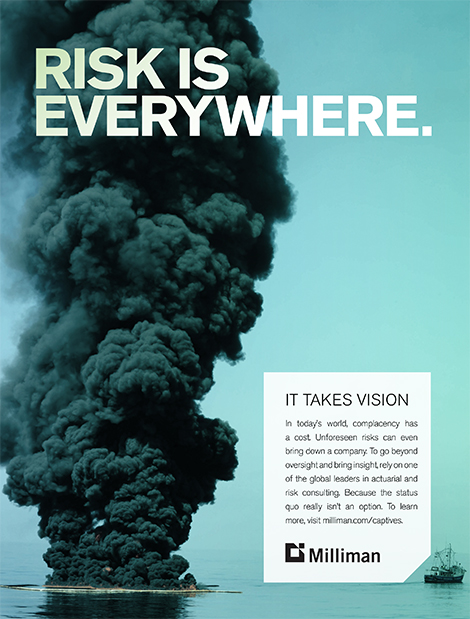With one domicile after another embarking on fresh campaigns to aggressively market themselves as the up-and-coming captive jurisdiction, it is quite refreshing to come across one with an altogether more serene approach to attracting potential captive owners and managers...
With one domicile after another embarking on fresh campaigns to aggressively market themselves as the up-and-coming captive jurisdiction, it is quite refreshing to come across one with an altogether more serene approach to attracting potential captive owners and managers.
Although it takes a great deal of pride in its insurance industry as a whole, Gibraltar is specifically in a good place at the moment in terms of its regulations, with measures relating to all forthcoming EU directives seemingly under control. In particular, Gibraltar is largely on course for Solvency II compliance by the January 2016 deadline, and the domicile’s Financial Services Commission (FSC) has already released its strategic plan up to 2017.
Perhaps unlike some of the other captive domiciles, the Gibraltar insurance scene differs in that the majority of the local undertakings are commercial insurers (for example, in the motor field, which is very strong), rather than captives.
Joe Perdoni, head of prudential at the FSC, says: “We are focused on making sure that well-managed, well-capitalised entities are setting up in our jurisdiction. Our key priorities are protecting the policyholder and protecting Gibraltar’s reputation as a finance centre.
We will also be a Solvency II-compliant jurisdiction, which may be more attractive to firms when compared to other jurisdictions. This may make it easier for firms based in the EU to select Gibraltar.”
Although there are several options open to firms in the event that they do decide to set up entities in the domicile, it is Gibraltar’s protected cell company (PCC) legislation that has proved the most popular. Alain Dufraisse, director at Aon Insurance Managers in Gibraltar, explains: “Gibraltar was the first EU domicile to introduce PCC legislation back in 2001, and Aon took this opportunity to set up White Rock Insurance (Gibraltar) PCC, the first ever (and largest, with over 50 cells established since 2002) EU-based PCC.”
Other promoters have followed either by forming new PCCs or by converting their existing undertakings into PCCs. This means that the Gibraltar captive offering is not limited to standalone companies, but extends to protected cells, for the benefit of corporates interested in self-insurance solutions.”
According to Dufraisse, there has been a shift in recent years in the origin of promoters. In other words, where Gibraltar has historically been a ‘UK-centric’ domicile in terms of its clientele, it is now attracting more and more business from mainland Europe.
He says: “The fact that our medium-size office employs six different European nationalities to service our international client base, clearly demonstrates this shift.”
For those who choose Gibraltar as a domicile for their insurance vehicle, the island also has a different approach to the way it goes about authorising newcomers.
Perdoni explains: “When going through the authorisation process, the answer can be a ‘yes’ or it can be a ‘no’, but the response will not be a long drawn out one in either circumstance. It is also very easy to arrange meetings with us.” It is this approachability and accessibility that may also differentiate Gibraltar from some of the other, larger captive domiciles.
The FSC, along with Gibraltar’s government, has also initiated plans to further streamline the regulatory procedure by rationalising more than 80 different pieces of current legislation and multiple FSC guidance notes into one act and a single accompanying regulatory handbook.
The joint initiative, dubbed the legislative reform programme, has been undertaken to deliver a more user-friendly framework for the range of financial and professional services in Gibraltar.
Within the proposal paper, the FSC said that the reforms will affect insurance companies, including insurance-linked securities (ILS) and reinsurance companies, insurance intermediaries, and insurance managers. The handbook will provide guidelines on conduct specific to insurance mediation, giving investment advice, acting as an insolvency practitioner, and acting as an auditor.
Perdoni adds: “The existing legislation has been developed on a piecemeal basis in response to market, European and international initiatives over the years, and this has resulted in a significant amount of primary and secondary legislation.”
“What we are trying to do with the legislative reform programme, in partnership with the government, is consolidate all of that legislation into something that is easier to understand and more navigable for practitioners. We hope that it will help facilitate innovation and speed-to-market, both now and in the future.”
This style of robust yet user-friendly regulation has allowed Gibraltar to branch out into new areas, such as ILS. Guidelines for ILS in Gibraltar were published in September 2014 and immediately generated interest.
Gibraltar is well positioned to manage ILS transactions given that key stakeholders including management companies such as Aon Insurance Managers, the ‘Big Four’ accountancy firms, and local lawyers are well versed in of these transactions.
Dufraisse comments: “Gibraltar has worked hard since early 2014 to create the right conditions for it to develop into a top ILS domicile.
It established, in partnership with some of the major ILS businesses from around the world, a working group, in which I had the privilege to participate, that provided industry expertise and feedback to Gibraltar’s FSC as it was preparing its ILS guidelines.”
Another achievement from Gibraltar’s busy 2014 was the Global Forum of the Organisation for Economic Co-operation and Development (OECD) granting Gibraltar’s government a “largely compliant” rating for its level of transparency and exchange of information for tax purposes.
The classification recognises what the OECD has termed Gibraltar’s “solid track record in international tax cooperation and compliance”, placing it on par with leading global economies including the UK and Germany, and giving international businesses added incentive to operate in the jurisdiction.
The forum’s second phase peer review report on Gibraltar examined 10 essential elements of the jurisdiction’s record in exchange of information, rating it “largely compliant” in three areas and “compliant” in the remaining seven. More importantly, no elements were found to be “non-compliant”, highlighting the strength of Gibraltar’s approach to corporate tax transparency, and the ethos of its FSC.
Gibraltar, along with approximately 57 countries, has committed to the automatic exchange of information under the Multilateral Competent Authority Agreement Automatic Exchange of Financial Account Information in 2017 and a further 31 countries have extended a similar commitment with an exchange trigger date of 2018.
Chief Minister of Gibraltar, Fabian Picardo, says: “[This] Gibraltar’s absolute commitment to a culture of compliance with international standards of transparency and reflects our continued emphasis on offering companies a stable environment in which to thrive. Gibraltar is a leader when it comes to compliance with modern standards of internationally established frameworks, in particular those within the EU, which is among the most rigorous in the world, making it the perfect home for international business.”
On reflection it seems that, without resorting to a great deal of back-patting, Gibraltar has nevertheless made itself a viable option for domiciling a captive.
While the OECD rating is certainly one of the key strengths of the domicile, particularly in the context of attracting European and international business, the regulatory environment in general is well suited to the discerning captive manager or owner. As Perdoni succinctly puts it: “Insurance in general is a very important area to Gibraltar.
We want to ensure that we have a vibrant, well-regulated, and appropriately-capitalised insurance market that provides suitable products to consumers, both within the jurisdiction and when they passport into other EU jurisdictions.”





